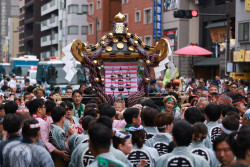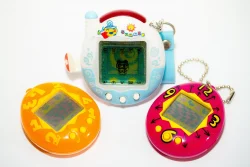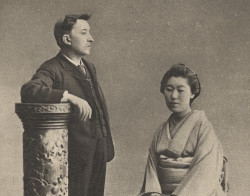
Originally published on metropolis.co.jp on September 2009

Photo by Fritz Schumann
Familiar scenario: you’re going to be marooned on an island and you can only bring X number of books with you. If that island happens to be part of the Japanese archipelago, you could do a lot worse than schlepping a copy of Hiroki Azuma’s Otaku: Japan’s Database Animals. First published in Japanese nine years ago and now available in English translation, this buoyant mishmash of philosophy, theory and pop culture has become a key text for people trying to wrap their heads around the current otaku boom, and the state of noughties Japan in general.
Azuma’s work explores otaku production and consumption, and what they suggest about man’s search for meaning. He argues that today’s otaku no longer crave narratives and wider significance, but are instead gratified by reading for character “elements”—things like cute cat ears, maid uniforms and loose socks. The upside is that you can find the spiky-haired, ramen-slurping protagonist of your dreams with an online search engine. The downside is a “world [that] drifts about materially without giving meaning to lives” and “humanity [functioning] at the level of database.”
The co-director of the Tokyo Institute of Technology Academy of Humanities, Azuma has penned six other books, and won the Suntory Literary Prize in 2000. He spoke to Metropolis about his goals for this one-of-a-kind bestseller, which he says was published as a “cultural intervention.”
Why did you write Otaku: Japan’s Database Animals for a general audience? In the late ’90s, Japan’s market for criticism nosedived. I felt a need to replenish and broaden it. There wasn’t really any criticism dealing with subculture, so I thought an analysis was overdue. Basically, we just had [influential economist and philosopher] Akira Asada’s new academism. New academism promised to explain subculture using postmodern theory, but it was totally biased. That said, I didn’t go into Otaku: Japan’s Database Animals wanting to analyze otaku culture. Rather than using a theoretical paradigm to analyze culture, I tried to change theory by using subculture on it. I also hoped to build a common language for discussion. Therefore, it would be a misconstrual to read this book as an analysis of otaku culture using postmodern theory.
According to your book, anime narratives and coffee mugs are afforded the same kind of social status. Could you please tell us about this? We’re now celebrating the 30th anniversary of Gundam. Three decades ago, Gundam’s coloring was chosen at the request of a toy company in order to sell robots. This kind of thing is standard practice. From the beginning, Japan’s anime culture has been based on selling toys. For this reason, there’s hardly any purpose in poring over Japanese anime or game narratives in and of themselves—they’re being produced to sell merchandise. There is a method called “Media Mix,” which was developed by Kadokawa Shoten Publishing. “Media Mix,” meaning to publish a series across different media channels, spurred on the production of manga as both a marketed good and as a vehicle to market goods.
What do you think about your book becoming a bestseller? Well, I’m pleased that the readership continues to increase each year and that my peers’ ideas, particularly those of Eiji Otsuka and Shinji Miyadai, are gaining exposure from my references. But actually, I didn’t write this for scholars. To be honest, I have no interest in whether or not the book is read by Japanese or American academics. I wrote this book for creative people. I also hope that junior high and high school students read my work. I want younger people to go through it in Japan and abroad. But since this may take years to accomplish, I’ve resigned myself to the fact that I’ll be read primarily in universities.
So you aren’t interested in academic acclaim? I don’t care how scholars interpret Otaku: Japan’s Database Animals. American graduate students may read my book and say, “I want write my PhD dissertation on moe” or “I’m going to do research on Japanese maid cafes”—but very little good will come of these kinds of research projects. I hope to liberate university knowledge from high culture. In order to achieve this goal, I selected otaku, because I believed they might become the intellectuals of the next generation. I don’t have any interest in investigating subculture within the university system. I want a new group of readers to engage with theory as well as the creative process.
Otaku: Japan’s Database Animals by Hiroki Azuma (University of Minnesota Press, 2009, 200pp, $17.95)







